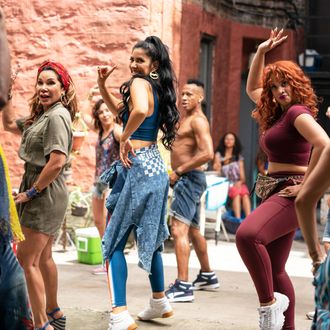
In the Heights, the major movie adaptation of Lin-Manuel Miranda’s 2008 Broadway musical, opened to a modest box office and largely positive critical reception this past weekend. But for all of the film’s themes of diversity and identity, In the Heights noticeably lacks dark-skinned Afro-Latinx performers or characters in any of the film’s major roles, of which there are many. The only Black character in the main cast, Benny, is played by non-Latino actor Corey Hawkins, and in the musical, his character is non-Latino and viewed by Nina’s father as an outsider. Meanwhile, all of the main Latinx characters are portrayed by light-skinned and white-passing actors, which viewers have pointed out on Twitter makes for an incomplete and inaccurate depiction of the Washington Heights neighborhood in New York City.
The Root’s Felice León addressed these concerns in an interview with In the Heights director Jon M. Chu and members of the film’s cast on Wednesday, June 9. “As a Black woman of Cuban descent, specifically from New York City,” León, who is a Black New Yorker of Cuban descent, asks Chu, “What would you say to folks who say that In the Heights privileges white-passing and light-skinned Latinx people?” Chu says, “I would say that that’s a fair conversation to have,” but doesn’t proceed to fully have it. Chu also faced accusations of colorism for his 2018 film, Crazy Rich Asians.
Leslie Grace, who is Afro-Latina and plays Nina, addresses the colorism at play in this film and Hollywood at large, saying, “I didn’t realize until making this movie that I didn’t really get to see myself or people that looked like my siblings, that are darker than me, onscreen.” She adds, “I hope that this is cracking that glass ceiling. Because I do hope to see my brothers and sisters that are darker than me lead these movies.”
Melissa Barrera, the Mexican actress who plays Vanessa, chimes in, saying, “In the audition process, which was a long audition process, there were a lot of Afro-Latinos there. A lot of darker skinned people. And I think they were looking for just the right people for the roles. For the person that embodied each character in the fullest extent,” clarifying, “Because the cast ended up being us, and because Washington Heights is a melting pot of Black and Latinx people, Jon and Lin wanted the dancers and the big numbers to feel very truthful to what the community looks like.” Chu also points León to diversity among the background dancers.
Update, Monday, June 14: On Monday, In the Heights creator Lin-Manuel Miranda, who appears in the film version of his stage musical as Washington Heights’ resident piragüero, posted a statement to Twitter apologizing for a lack of dark-skinned Afro-Latino representation in the work.
“I started writing In the Heights because I didn’t feel seen,” he says. “And over the past 20 years all I wanted was for us — ALL of us — to feel seen. I’m seeing the discussion around Afro-Latino representation in our film this weekend, and it is clear that many in our dark-skinned Afro-Latino community don’t feel sufficiently represented within it, particularly among the leading roles. I can hear the hurt and frustration over colorism, of feeling unseen in the feedback. I hear that, without sufficient dark-skinned Afro-Latino representation, the world feels extractive of the community we wanted so much to represent with pride and joy.”
“In trying to paint a mosaic of this community, we fell short,” Miranda continues. “I’m truly sorry. I’m learning from the feedback, I thank you for raising it, and I’m listening. I’m trying to hold space for both the incredible pride in the movie we made and be accountable for our shortcomings. Thank you for your honest feedback. I promise to do better in my future projects, and I’m dedicated to the learning and evolving we all have to do to make sure we are honoring our diverse and vibrant community.”
Update, Wednesday, June 16: Rita Moreno, the legendary Puerto Rican actress who portrayed Anita in that other New York City musical-comedy, was asked about In the Heights’ colorism issues on Tuesday’s The Late Show. “You can never do right, it seems. This is the man who literally has brought Latino-ness and Puerto Rican-ness to America. I couldn’t do it,” she responded, referring to Lin-Manuel Miranda, who, as previously noted, wrote the music and lyrics of the original musical. “I mean, I would love to say I did, but I couldn’t. Lin-Manuel has done that, really single-handedly, and I was thrilled to pieces and I’m proud that he produced my documentary.” When asked by Stephen Colbert to clarify if she believes the criticisms are justified, particularly to Miranda, Moreno made it clear that she didn’t agree.
“Well, I’m simply saying, can’t you just wait a while and leave it alone? There’s a lot of people who are Puerto Rican who are also from Guatemala who are dark and who are also fair,” she explained. “We are all colors in Puerto Rico. This is how it is. It would be so nice if they hadn’t come up with that and left it alone, just for now. They’re really attacking the wrong person.” Moreno added that the criticisms “really upset me.”
Update Wednesday June 16, 7:00PM
Rita Moreno tweeted a walking back of her remarks on The Late Show. “I’m incredibly disappointed with myself,” she wrote. “While making a statement in defense of Lin-Manuel Miranda on the Colbert Show last night, I was clearly dismissive of black lives that matter in our Latin community. It is so easy to forget how celebration for some is lament for others.” Moreno added that she is making a conscious decision to be more inclusive of the Afro-Latino community, and not letting anyone give her a pass due to her age, concluding that you “CAN teach this dog new tricks.”


